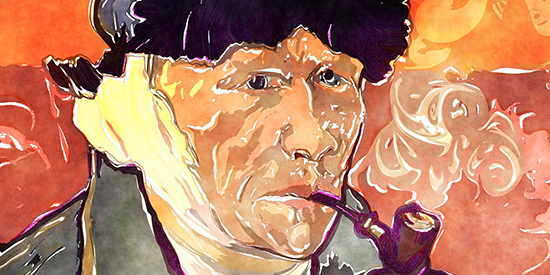Exploring Van Gogh and the myth of the troubled genius
Media releaseDutch artist Vincent van Gogh famously cut off his own ear and spent years in asylum while painting his masterpieces, but according to a Deakin psychiatry expert the myth of the troubled genius should be taken with a grain of salt.
Professor Michael Berk, Director of Deakin's Centre for Innovation in Mental and Physical Health and Clinical Treatment, said there were many unanswered questions when it came to the life and death of Van Gogh.
"He's been retrospectively diagnosed with bipolar disorder, as well as psychosis and maybe even autistic like behaviours," Professor Berk said.
"When he cut off his ear it was most likely in psychotic episode, but all we can really do is speculate because there is little evidence on his state of mind."
Next week, Professor Berk will be joined by University of Melbourne art historian Dr Anthony White and ABC Radio National presenter Lynne Malcolm for a panel discussion on Van Gogh's life and work, currently on show at the National Gallery of Victoria in Van Gogh and the Seasons.
While the cause or scope of Van Gogh's demons can never be truly known, Professor Berk said much of great art and literature had come out of adversity.
"Creativity is often an adaptive and healthy way of making sense of a world that is difficult, dealing with the complexity, distress and confusion of life," he said.
"It doesn’t necessarily mean these people are necessarily unwell, though it can help make sense of your experience, and give it some meaning and purpose."
Professor Berk said the people most vulnerable to developing disorders like bipolar disorder were, with bitter irony, more likely to be the most intelligent and creative among us.
"There is good evidence that a higher IQ and academic attainment in youth is associated with greater risk of developing bipolar disorder," he said.
"From a Darwinian perspective the factors allowing you to be more creative, think outside the box, are sometimes amplified to the point that it goes too far and you might lose contact with reality."
But Professor Berk said the blanket stereotype of the 'crazy artist' was not helpful.
"The vast majority of artists are not crazy," he said.
"Some great art comes out of people who live a charmed life. Some like Matisse lived very comfortably and produced beautiful art.
"And if you look at Van Gogh's life, during his most unwell periods he was not productive and was not able to paint. His creativity returned when he recovered.
"So it is important that people, including artists, do stay on top of their mental health issues. Effective treatment is there to help people recover such that they are able to realise their potential.
"We want to get away from the notion that creative people are mentally unwell, or that some degree of illness is necessary for creativity.
"But creativity can be a helpful tool to cope and to make sense of turmoil."
'The Myth of the Troubled Genius' panel discussion will be held at NGV International on Tuesday 13 June as part of the programming for Van Gogh and the Seasons.

